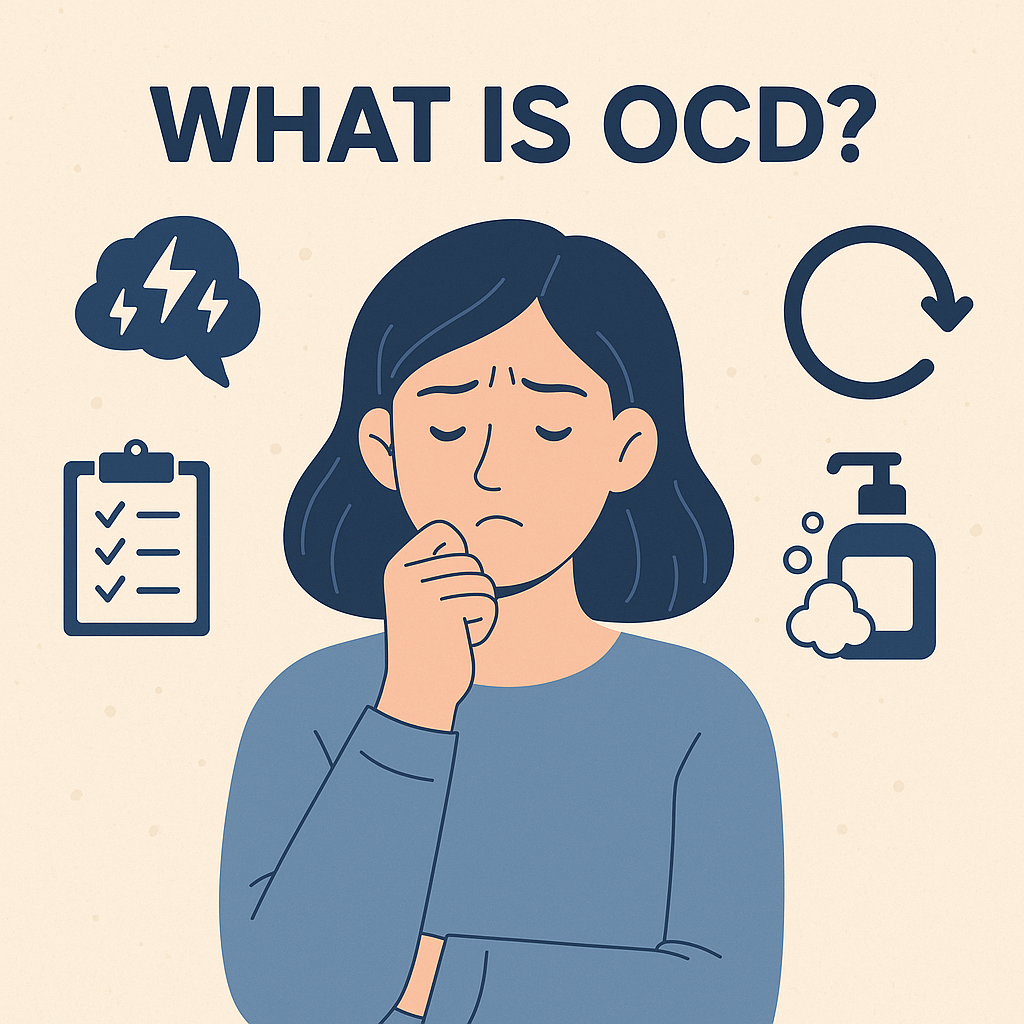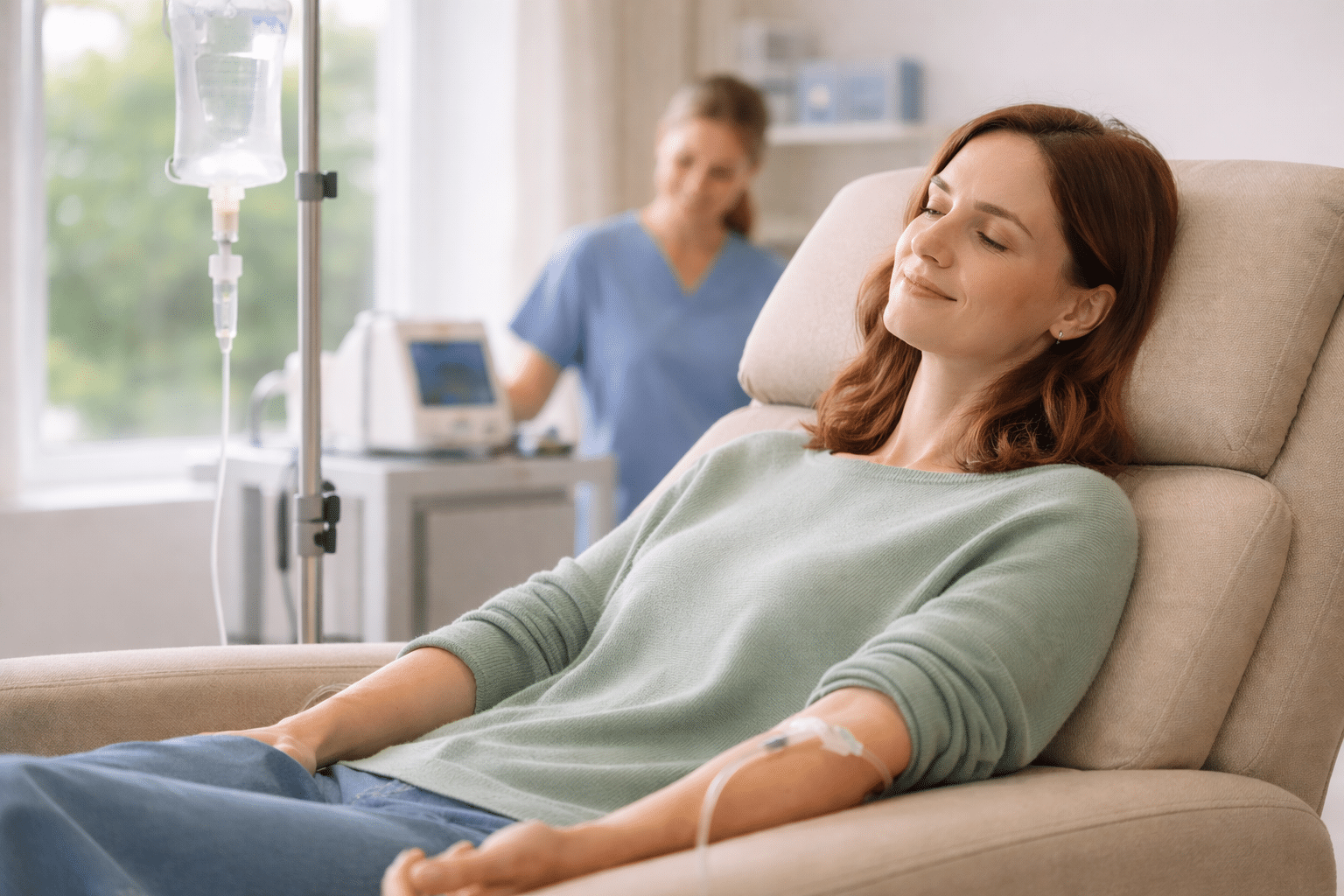If you’ve ever wondered “Do I have OCD?” or caught yourself saying “I’m so OCD” when things feel messy, you’re not alone. But obsessive-compulsive disorder (OCD) is far more than quirks or a preference for tidiness. It’s a mental health condition that affects millions of people worldwide, often interfering with daily life.
This guide breaks down what OCD is, what causes it, the symptoms to watch for, and how effective treatments can help you regain balance.
What Is OCD?
OCD stands for obsessive-compulsive disorder, a mental illness characterized by two core features:
- Obsessions: Unwanted, intrusive thoughts, images, or urges that cause distress.
- Compulsions: Repetitive behaviors or mental rituals performed to reduce the anxiety triggered by obsessions.
According to the National Institute of Mental Health (NIMH), about 1 in 100 U.S. adults are affected by OCD in any given year .
Common Symptoms
OCD can look different from person to person, but symptoms generally fall into patterns.
Obsessions
- Fear of contamination or germs
- Intrusive thoughts about harming yourself or others
- Disturbing or taboo thoughts (e.g., sexual, violent, religious)
- Need for symmetry, order, or “just right” feelings
Compulsions
- Excessive cleaning or handwashing
- Repeated checking (locks, stoves, switches)
- Counting, tapping, or repeating words silently
- Arranging items in a specific way
These symptoms are more than habits. They take up time, create distress, and often interfere with relationships, work, or school .
Types of OCD
Experts often describe OCD in subtypes, though many people experience overlap:
- Contamination OCD (fear of germs, excessive washing)
- Checking OCD (fear of harm, repeated checking)
- Symmetry/Ordering OCD (need for precision and balance)
- Intrusive Thoughts OCD (unwanted taboo or harmful thoughts)
Knowing the type doesn’t change the diagnosis but can help tailor treatment strategies.
What Causes OCD?
The exact cause of OCD isn’t fully understood, but research points to several factors:
- Brain circuits: OCD has been linked to irregularities in brain regions involved in decision-making and habit formation .
- Genetics: Having a first-degree relative with OCD increases the risk .
- Environment: Stressful or traumatic events can trigger or worsen symptoms.
- Neurochemistry: Imbalances in serotonin, a neurotransmitter that regulates mood and impulses, may contribute.
Importantly, OCD isn’t your fault. It’s not caused by being “too uptight” or “controlling.” It’s a medical condition rooted in biology and environment.
Is OCD Curable?
OCD isn’t “curable” in the traditional sense, but it is highly treatable. With the right care, many people manage symptoms effectively and live full lives.
How OCD Is Diagnosed
There’s no lab test for OCD. Diagnosis of OCD is made by a mental health professional through:
- A detailed history of symptoms and their impact
- Clinical interviews using DSM-5 criteria
- Screening tools, such as the Yale-Brown Obsessive Compulsive Scale (Y-BOCS)
If symptoms take up more than an hour a day or disrupt daily life, professional evaluation is recommended .
OCD Treatment Options
1. Therapy
The gold-standard therapy for OCD is exposure and response prevention (ERP), a form of cognitive behavioral therapy (CBT). ERP helps people face fears gradually while resisting compulsions. Studies consistently show ERP to be highly effective .
2. Medication
According to the Mayo Clinic, certain antidepressants called SSRIs (e.g., fluoxetine, sertraline) are FDA-approved for OCD. Higher doses than those used for depression are often required. Medication can be especially helpful for people with severe symptoms .
3. Advanced Treatments
For people with treatment-resistant OCD, options may include:
- Transcranial magnetic stimulation (TMS)
- Deep brain stimulation (DBS) in rare cases
- Combined therapy and medication approaches
How to Calm Symptoms Daily
While professional treatment is the cornerstone, self-help strategies can support recovery:
- Practice mindfulness or meditation to reduce reactivity to intrusive thoughts
- Keep a structured routine to limit decision fatigue
- Join OCD support groups (online or local) for shared coping strategies
- Stay physically active — exercise has been linked to improved mental health outcomes
Finding OCD Treatment in Folsom, Roseville, and Sacramento
Living with OCD can feel overwhelming, but effective treatment is available—and recovery is possible. Whether you’re dealing with intrusive thoughts, compulsive behaviors, or simply wondering if what you’re experiencing is OCD, professional support makes all the difference.
At Zeam Health & Wellness, we provide compassionate, evidence-based care for patients in Folsom, Roseville, and Sacramento. Our providers specialize in diagnosing and treating OCD with proven approaches such as cognitive behavioral therapy (CBT), exposure and response prevention (ERP), and medication management when needed.
If you’ve been searching for “OCD treatment near me” and want a supportive, judgment-free environment to begin your journey, we invite you to reach out. Contact Zeam today to schedule an appointment and take the first step toward relief and lasting progress.
Key Takeaways
- OCD is a mental illness, not a personality trait.
- Symptoms involve both obsessions (thoughts) and compulsions (behaviors).
- OCD affects about 1 in 100 U.S. adults annually.
- Causes involve brain circuits, genetics, and environmental triggers.
- Effective treatments include ERP therapy, medication, and advanced options for resistant cases.
- Early diagnosis and treatment significantly improve outcomes.




